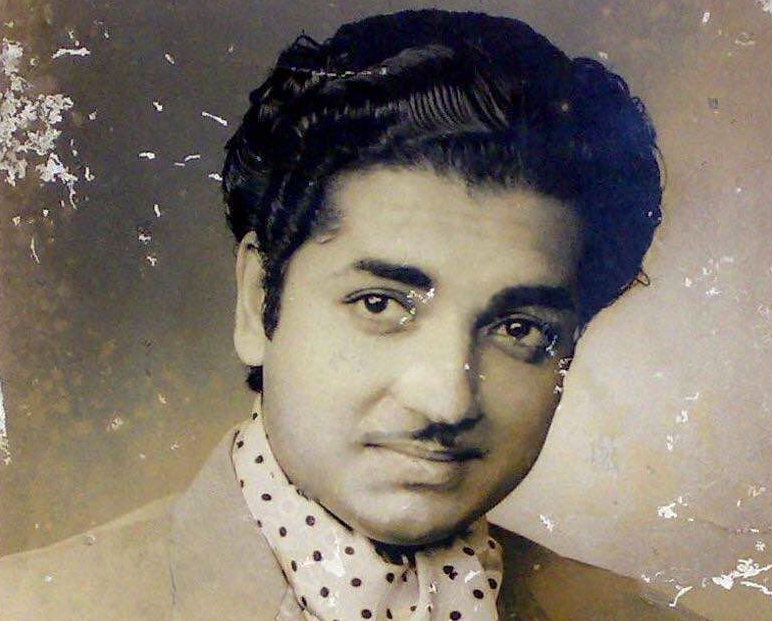The figures are to put it mildly – staggering! Well over 500 films as leading man, over a 100 films paired with the same heroine, 39 releases in a single year (1979), dual roles in more than 30 films – such was the prolific output of Malayalam cinema’s biggest superstar – Prem Nazir. Little wonder he was called the evergreen hero of Malayalam filmdom.
Nazir was born Chiriyinkil Abdul Kader in Chiriyinkil, Trivandrum in 1928. He did his graduation from St. Berchman’s College, Changanassery. The bulk of Nazir’s work came for the Udaya and Merryland Studios, where he was the first of a new generation of post Independent Malayalam stars like Madhu and Sathyan. Nazir, who made his screen debut in 1952, was known as a romantic hero (somewhat in the manner of Gemini Ganesan) and the embodiment of the ideal male as against the brooding, remote outsider persona of Sathyan and the sad, suffering lover of Madhu. He and actress Sheela formed one of the greatest romantic pair of Malayam Cinema, in fact Indian Cinema, having done over 100 films opposite each other!
Nazir’s films drew attention to exploitative aspects of social and religious systems (Padatha Paingili (1957)), the breakdown of the joint family (Maya (1972)) and the modern engagement with folk narratives (Unniyarcha (1961)). But among the best of Nazir’s many, many films are perhaps MT Vasudevan Nair’s trilogy of life in Feudal Kerala – Murappennu (1965), Irutinte Atmavu (1967) and Asuravithu (1968).
Murappennu was one of Vasudevan Nair’s first major film scripts – a joint family melodrama about the social impotence of righteous people. The film created a distinct brand of melodrama as social critique in Malayalam. Irutinte Atmavu saw Nazir playing a mentally retarded man as the film questioned the feudal values of a declining Nair community. Nazir played perhaps his best ever role with aplomb whether swinging in ecstasy from one areca tree to another or convincingly exploiting the tear jerking sympathy generated by his character as he finally agrees to be defined as mad. Asuravithu was set in the communally charged violence between Hindu and Muslim communities. When thrown out of his family, Nazir moves in with a Muslim friend and eventually converts himself to Islam. It was an extremely daring film for its times.
Nazir played all sorts of roles ranging from mythological to socials to James Bond like. He continued as a hero well into the 1970s but in the 80s, with age catching up with him, he began veering towards character roles and key supporting roles as a new generation of heroes like Jayan, Sukumaran and Soman took over. This shift to character roles did see some powerful roles come to him, keeping his career going in high gear.
Prem Nazir Kanmanilla (1983) saw Nazir play himself, kidnapped by tribals and forgotten by the outside world as he matches his wits with that of the tribals living outside his definitions of the world (Inspiration for the Rajkumar kidnapping by Veerappan???). It illustrated what a huge icon he had become in Malayalam Cinema by then.
Nazir’s peak as an actor was accompanied by the emergence of the famous Malayalam lyricists – Vyalar Rama Varma, ONV Kurup and P Bhaskaran. The pairing of singer Yesudas and actor Nazir has led to some of the most memorable songs in the history of Malayam Cinema. Some popular songs that Yesudas sang for Nazir include Aayiram Padasaarangal, Aval Chirichal, Indravallari, Kadu Karutha Kadu, Karayunnu Puzha, Mayajala Vathil, Paadatha Veenayum, Puzhakal Malakal and Sumangali Nee.
Nazir was a recipient of the Padmashri and Padma Bhushan awards. He also had a short but unsuccessful stint in politics. His brother, Prem Nawaz, also acted in a few films and son, Shanawaz too tried his luck as an actor but could not succeed like his father. Nazir also wrote a book on the film characters he essayed, Enne Thediyetha Kathapatrangal.
Prem Nazir passed away on January 16, 1989. His last completed film was Dhwani (1989) while Priyadarshan’s Kadathanadan Ambadi (1990) was his last release. His death marked the end of a glorious era in Malayalam cinema.


